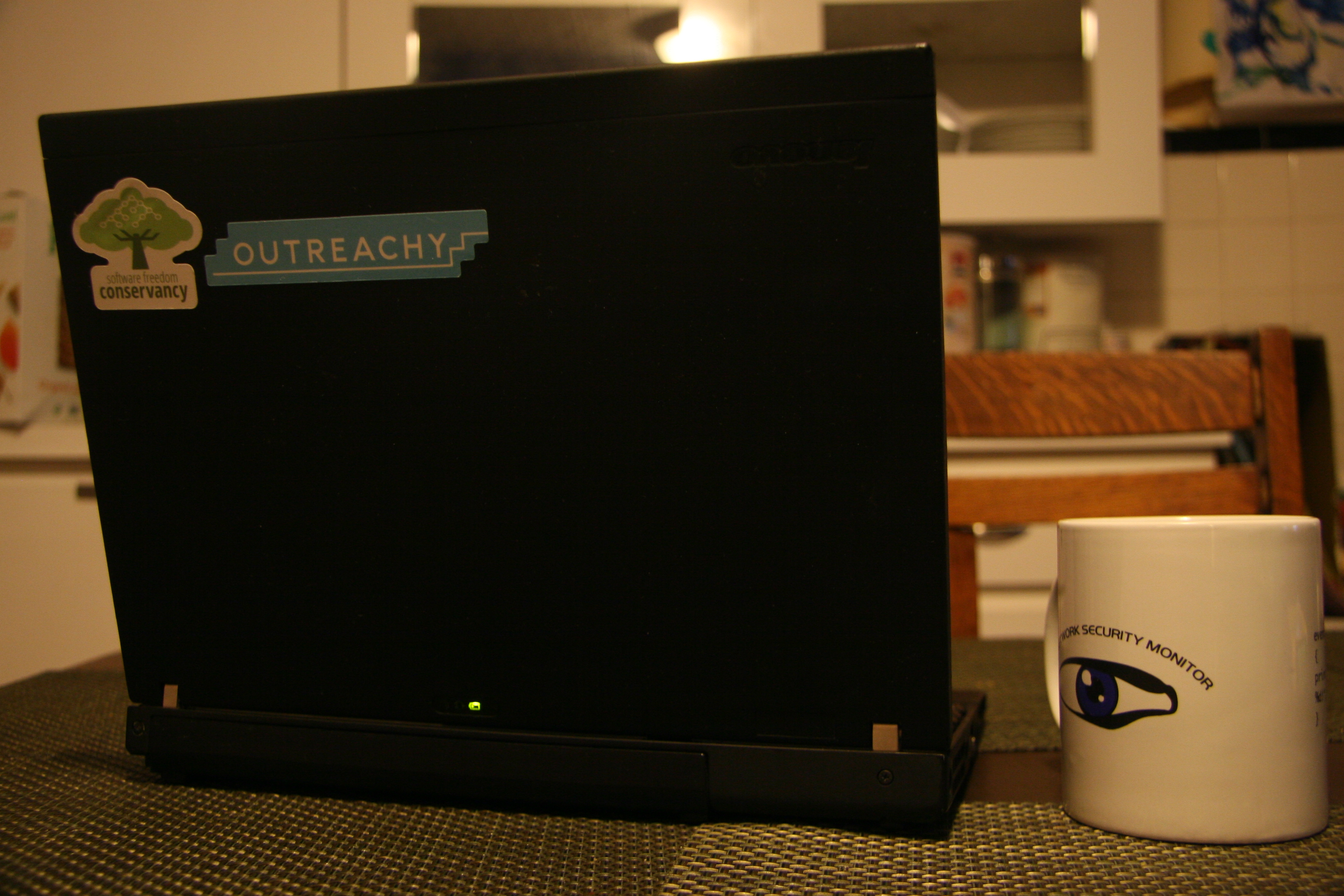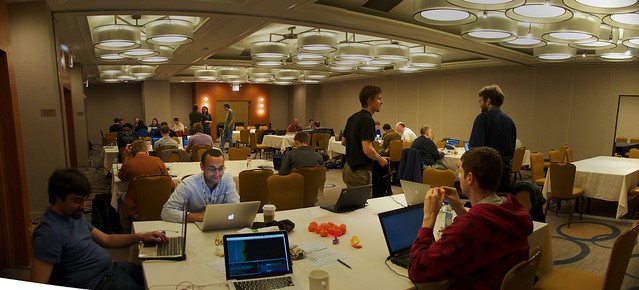![[RSS]](/static/img/feed-icon-14x14.2168a573d0d4.png) Conservancy Blog
Conservancy Blog
ICYMI: “Companies, Free Software, and You”
by on December 8, 2016
At this year’s LibrePlanet, I presented “Companies, Free Software, and You” as a keynote presentation. In the talk, I take a hard look at companies’ engagement in the free software community, dissecting which contributions are productive and weighing them against instances where their interests might diverge from the rest of the community’s.
When that happens, Conservancy is a strong independent voice fighting for the community’s interests, in project leadership, employment agreements, license compliance, and more. Please support Conservancy today to keep the conversation balanced!
Thanks to the Free Software Foundation for running another great conference and preparing this video! Both the talk and the recording are released under CC BY-SA 4.0.
System improvements at Conservancy
by on December 7, 2016
When I joined Conservancy, we discussed system administration as one of my early responsibilities. (One of many—you might remember the long list of possible functions for my position.) Like any organization our size, there are plenty of improvements to our systems that we wanted to make, but were tough to prioritize against our other responsibilities. Since I joined in August, I’ve kept an eye out for easy opportunities to invest a little time now that will save us effort in the long run. As we start looking back on 2016, I wanted to highlight some of the public-facing improvements that I’ve made as part of this effort, and share a little about the tools and services that make them possible.
I deployed domain keys on our mail servers. Now each outgoing e-mail is signed to demonstrate that it came from an authorized user at Conservancy, and not an impostor. To make a long story short, this means our mail is more likely to land in your inbox, and not in your spam folder.
Thanks to our friends at Let’s Encrypt, all of Conservancy’s web sites are served over HTTPS exclusively. This includes not just our main site here and copyleft.org, but also web front-ends for Mailman and Kallithea. Using HTTPS everywhere helps keeps everyone’s communications with us more secure.
It’s nice that Let’s Encrypt offers free SSL certificates to save us money, but I think what I like even more is that the service saves us time. Using their client software, I’ve mostly automated the process of obtaining and renewing certificates. We don’t have to manually track expiration dates, renew certificates, and install them on our systems anymore. That time is freed up to help our member projects.
I wrote systemd service definitions for several public-facing services that didn’t already have them. Before this, each service was managed by ad hoc scripts, which could fail if something unusual happened. systemd has given us a simple, standard way to manage each service and its runtime environment. We get more service reliability and security for less effort.
I built tools to help automate some of Conservancy’s day-to-day accounting work. Our biggest project here is the payment and reimbursement request system, which is still in development. Behind the scenes, I’ve also written some scripts to help automate smaller tasks like saving and filing receipts from our different accounts.
I upgraded our Kallithea installations to the latest stable version, here and on copyleft.org. This was my first time working with Kallithea, but their documentation made the upgrade process a breeze. We’ve seen improved service stability and uptime with the new version, too. Kudos to the entire Kallithea team for a job well done.

A typical Conservancy office
© Karen Sandler, CC BY-SA
This is all in addition to some usual day-to-day system administration: buying and managing domains, keeping up-to-date with security fixes, and so on. All this work should all make Conservancy’s systems a little nicer for everyone who uses them today, and free up all our time for more important work tomorrow. I love having this opportunity to put some of my technical know-how to good use, so Conservancy can better serve its member projects and the broader FOSS community, and that wouldn’t happen without help from the Supporters who sustain our operations. If you’re already a Supporter, thank you for making this work possible. If not, please join today so we can continue providing necessary infrastructure for important FOSS projects.
Come see Conservancy at linux.conf.au 2017
by on December 5, 2016
Are you coming to linux.conf.au in January? So are we! We’re presenting a variety of sessions, so whether you’re just starting to learn about free and open source software, or a seasoned contributor who wants to hear about cutting-edge issues, we’ve got something for you.
On Thursday Karen and Bradley offer A Practical Guide to Compliance with the GNU GPL, a pragmatic tutorial on how to comply with the most popular FOSS license. The focus is on providing concrete actions you can take to comply. There’s something for everyone who works with GPL’ed software, whether you’re an upstream contributor, distributor, or lawyer.
On Friday Karen presents Surviving the Next 30 Years of Free Software. As the FOSS community matures and time marches on, we’re starting to see cases where a contributor passes away and a project has to work out legalities with their estate. Karen will explain the law in this area, and suggest next steps for projects and the broader community to make these transitions easier.
As part of the Kernel Miniconf, we’ll also run another feedback session about our GPL Compliance Project for Linux Developers. Just like the sessions at ELC EU and LPC, this is your opportunity to hear more about what the program does, how it works, ask questions, and offer ideas for improvement. All interested contributors are welcome to attend. We’ll announce schedule details as they’re available.
We’re looking forward to seeing everyone in Hobart!
Code Sprints, Contractors, and Commits: PyPy in 2016
by on December 1, 2016
This series covers new developments and exciting projects taken on by Conservancy member projects. To learn more about Conservancy member projects, or the non-profit infrastructure support and services offered by the Conservancy, check out Conservancy’s Projects page!
Thanks to the generous support of donors and contributors, PyPy contracted Ronan Lamy at the beginning of June to help move forward work on Py3k. Lamy has been a Pypy core developer since 2012, and his work in refactoring old code has been invaluable to the project.
PyPy is an implementation of Python, one of the most popular programming languages in the world. It’s fast and light without sacrificing features available in CPython and other systems used to execute programs written in Python.

PyPy sprint at PyCon 2012
Courtesy of Taavi Burns. CC-BY
The Py3k project is important for the future of PyPy. Since the publication of Python 3, coders, developers, and organizations have been tackling the technical and social challenges of updating from Python 2. For PyPy, supporting Python 3 means supporting the Python community—those wanting to use PyPy will be able to work with projects using Python 2 and Python 3. In addition to donations received through the Conservancy’s fiscal sponsorship, a $200,000 award from the Mozilla Foundation to Baroque Software is helping to make a Python 3.5 PyPy a reality.
Over June, Lamy made hundreds of commits to PyPy—creating clean code, fixing translations, increasing testing capabilities, and expanding Windows functionality. Rather relentless, he combed through commits and contributions, chasing down everything from unnecessarily hacky code to serious problems. Without the financial support of donors, this work would likely remain unfinished. Lamy spoke at PyCon UK this September, where he talked about the current state of PyPy.
Currently, PyPy is a “good and… usable drop-in replacement for CPython” for 2.7, and during 2017 that usability should extend to Python 3.3 and 3.5. In order to achieve this goal, Python 3.5 will continue to be a major priority for PyPy in the months ahead, as well as JIT code generation. Additionally, there are a number of “side projects,” like RevDB.
Interested in getting involved with PyPy? There are lots of ways to contribute to the project—check out the documentation for details! You can also help them along by donating to the project.
Next page (older) » « Previous page (newer)
1 2 3 4 5 6 7 8 9 10 11 12 13 14 15 16 17 18 19 20 21 22 23 24 25 26 27 28 29 30 31 32 33 34 35 36 37 38 39 40 41 42 43 44 45 46 47 48 49 50 51 [52] 53 54 55 56 57 58 59 60 61 62 63 64 65 66 67 68
